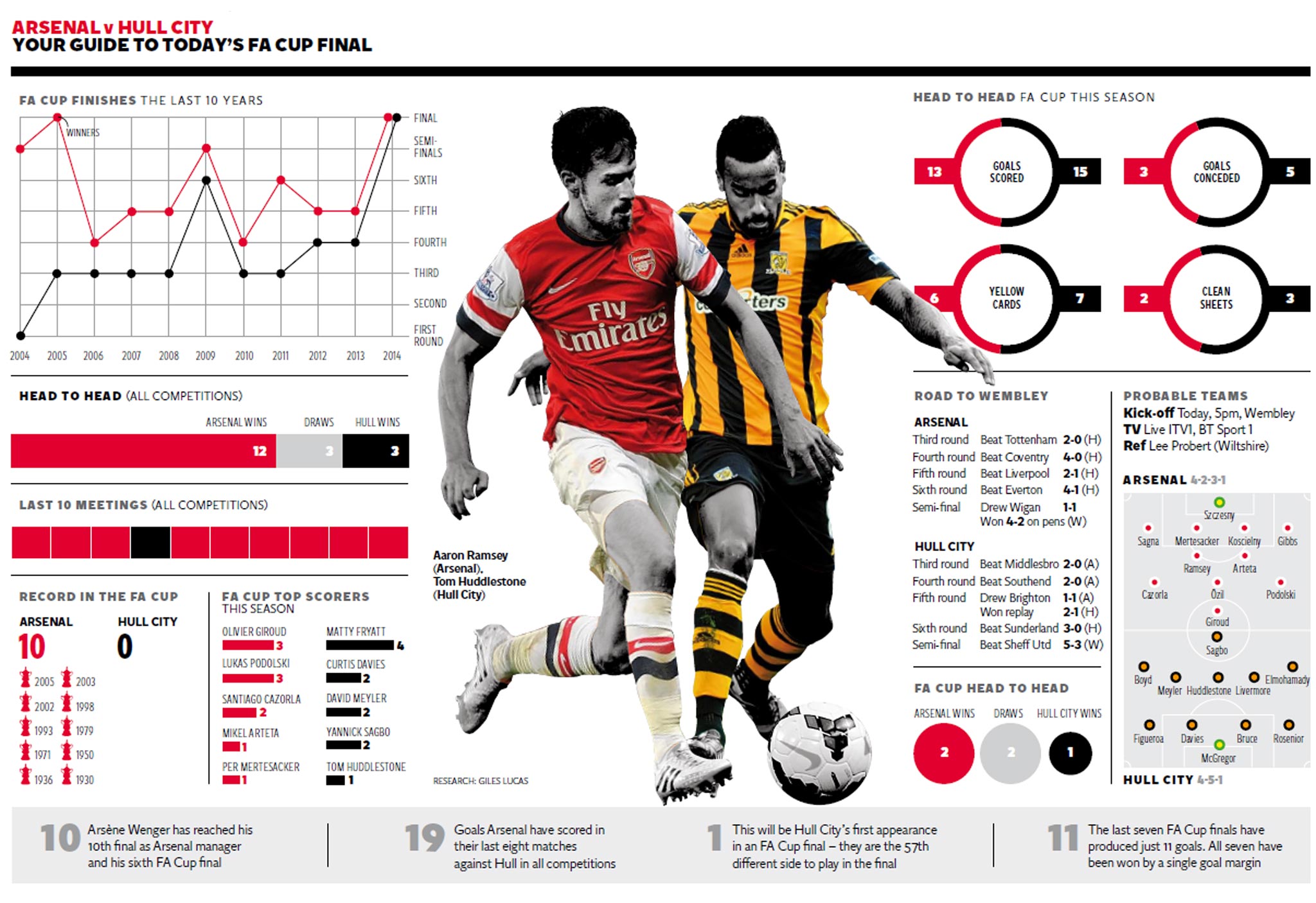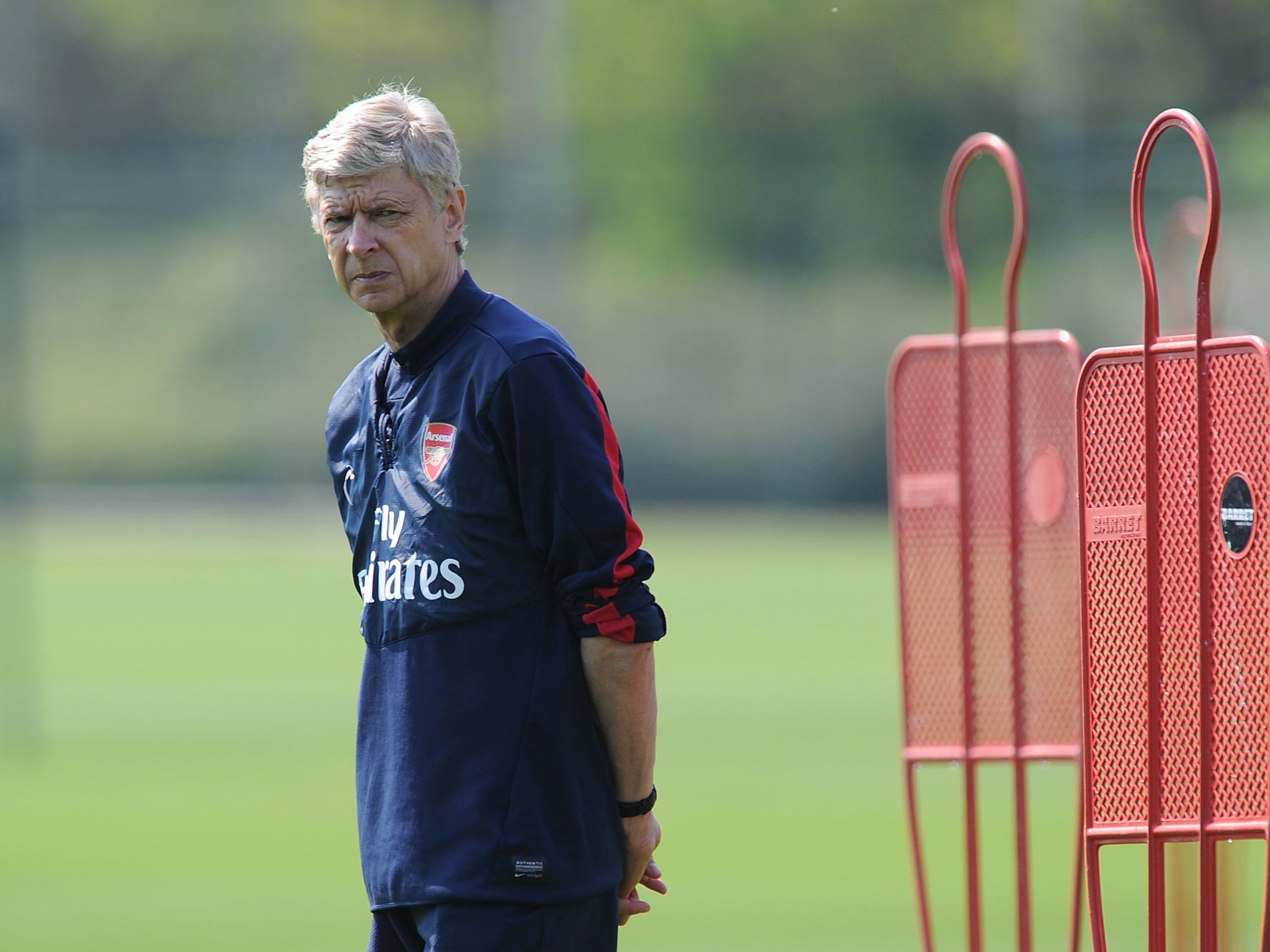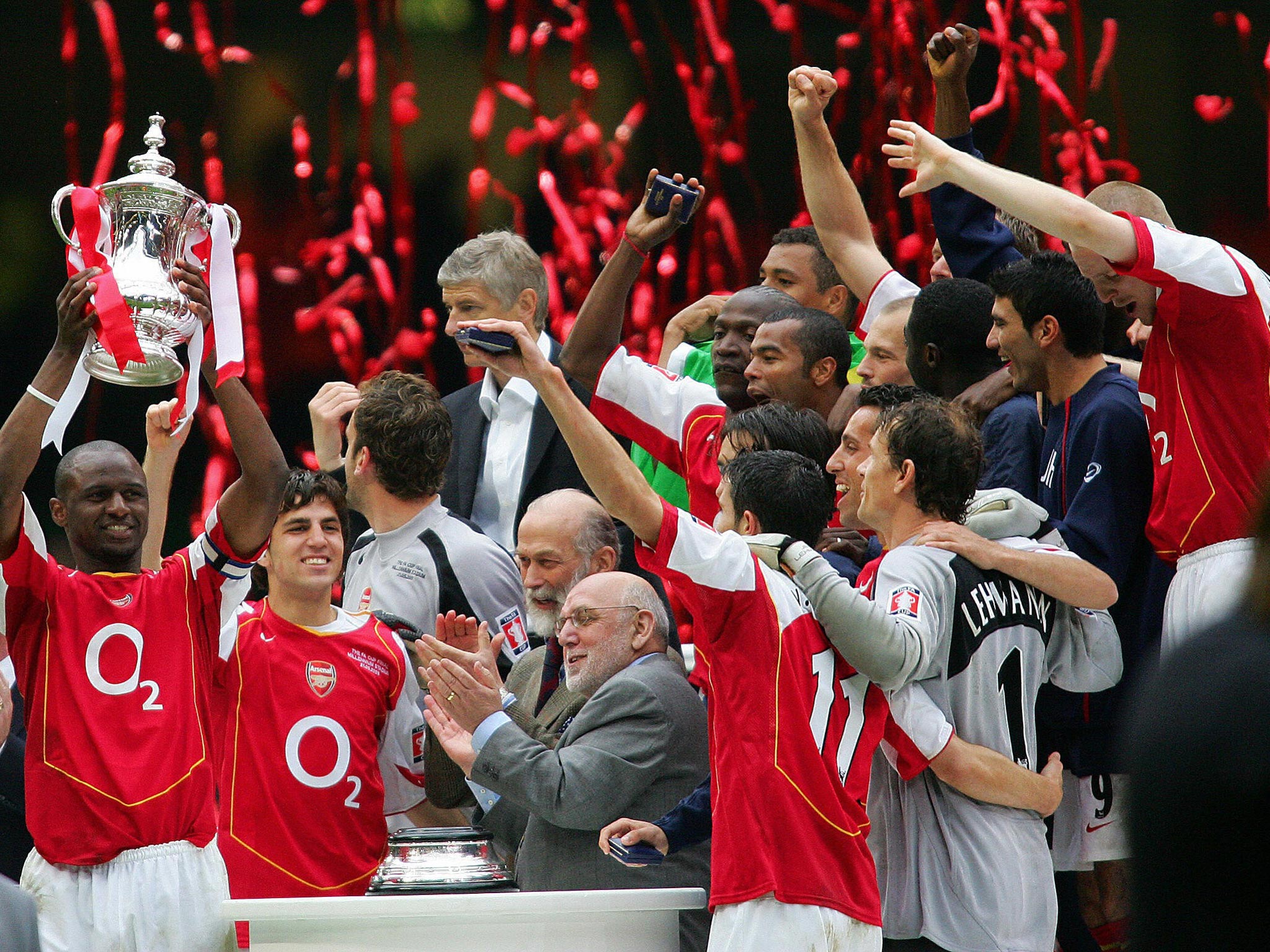FA Cup Final 2014: Arsène Wenger faces crossroads as Arsenal seek to end drought
First trophy in nine years can usher in new era of success but defeat to Hull might spell the end for long-standing manager

Your support helps us to tell the story
From reproductive rights to climate change to Big Tech, The Independent is on the ground when the story is developing. Whether it's investigating the financials of Elon Musk's pro-Trump PAC or producing our latest documentary, 'The A Word', which shines a light on the American women fighting for reproductive rights, we know how important it is to parse out the facts from the messaging.
At such a critical moment in US history, we need reporters on the ground. Your donation allows us to keep sending journalists to speak to both sides of the story.
The Independent is trusted by Americans across the entire political spectrum. And unlike many other quality news outlets, we choose not to lock Americans out of our reporting and analysis with paywalls. We believe quality journalism should be available to everyone, paid for by those who can afford it.
Your support makes all the difference.Arsène Wenger will lead Arsenal into the Wembley sunshine tomorrow afternoon promising that he will see his team and his fans again. The FA Cup final is not just the last game of the season but the last of the contract he signed in August 2010.
For months Wenger has been insisting that he will sign a new deal, to be announced when the time is right. But with no news yet, Arsenal fans could be forgiven for wondering whether tomorrow might be something other than a coronation.
This match – against a Hull City side more than capable of throwing a spanner into the works – and the next few days and weeks will, one way or another, be a decisive period in Arsenal's modern history.
Of course, Hull could win, and if they did it would be a perfect climax to two years of impressive improvement under Steve Bruce. It would be the first major trophy in the club's history, but that 110-year wait, important as it is, is not a national obsession, not like Arsenal's recent run.
This is Arsenal's first final for more than three years, their first FA Cup final since 2005 and a glaringly good chance to end their nine-year trophy drought. If they won, it would make some sense of their difficult last decade and could be – as Mikel Arteta said this week – a "great turning point" in the club's history.

Victory would cast Wenger as a heroic figure, who led the club safely through the enforced austerity of the new stadium years, emerging out of the other side with status intact and back amongst glittering silver.
Defeat, though, would be a disaster. Not only would it feel worse than any of their other recent final losses – 2006 to Barcelona, 2007 to Chelsea, even 2011 to Birmingham City – but it would dissolve much of the support Arsenal fans have for a new Wenger deal.
Even beyond any effect it might have on the Frenchman's own enthusiasm for the future – he has kept his thoughts very much to himself all season – it would be far harder to break the news to the supporters should the unthinkable happen.
The mutinous atmosphere which seeped through during the 3-1 home defeat to Aston Villa on the opening day of the season, nine months ago, has been largely subdued ever since. FA Cup defeat would risk releasing it again, tainting the whole summer in such a way that it is hard to see an outcome that pleases everyone.
Wenger, though, speaking to the press this week, was in no mood to comply with anyone else's narrative. For him, the last nine years have not been about the absence of trophies, but the consistent presence of Champions League football, hard-earned for 18 straight seasons.
"It has become a way to think for everybody like that," Wenger said on Wednesday morning. "If you look at the overall consistency, nobody has finished in the Champions League in England for 18 years. Nobody. But it is true that because we were used to winning every year, basically, and suddenly you don't win it becomes a way of thinking and a way of making press conferences."
For Wenger, Arsenal's record is subject to far more scrutiny than that of other teams, and betrays skewed priorities. "You could go to some other clubs: 'why did you not win the championship for 20 years?' Nobody asks them the question. It has just become the non-creative way for everybody to organise press conferences. Having said that, of course, we want to win every year but it's difficult."
Wenger did concede that something is missing, that Arsenal's consistent record was not backed up by silverware. "It matters for your fans. It matters for us. It's a concrete sign that you win. That's what we want to do. I love to win. Your fans love you to win. Your fans will be happy when you win trophies."
But when it came to the psychological importance of a win, and how that might launch Arsenal into a more successful future, Wenger was not particularly keen to reflect too much. "I don't know," he said when asked about such a boost. "The last thing in my mind is all that. It is the next game. I want to win the next game. It's an FA Cup final. I want to win the FA Cup final."
Wenger could certainly be forgiven for trying not to paint the final as a mental test for his team. The history of the last nine years is not only about diminished performance but the inability to close anything out or see anything through. They have lost their last three finals, and another three semi-finals, as well as fading in title challenges, this season, in 2010-11 and 2007-08.
Among all those painful moments, their last final, for the League Cup in 2011, was probably the worst. Arsenal were playing Alex McLeish's Birmingham City – who were subsequently relegated – but lost the game with a terrible last-minute defensive error. It sent the team into a negative spiral – they lost Cesc Fabregas and Samir Nasri that summer, and were beaten 8-2 at Old Trafford at the start of the following season – which took them almost 12 months to recover from.
Had Arsenal won that afternoon, they would surely have gone on to do far better since. Wenger, unsurprisingly, was in no mood to dwell on those memories or to draw comparisons. "I don't reflect at all, it was a different game," he said. "I don't think about it at all. The good thing in our job is you think about the next game. Never look back, other people do that for you. You just look in front of you for the next game."
It was a very different Arsenal side – including Patrick Vieira, Gilberto Silva, Kolo Touré, Jens Lehmann and Ashley Cole – which won their last Cup final, on penalties against Manchester United in 2005. That team, one year on from the Invincibles season, had a stronger spine than any Arsenal side since. Wenger described that win as "ugly" and "lucky" but that is nothing to be ashamed of; none of his sides has been able to win like that since.
Three years before that – remember that Arsenal won three FA Cups in four years just a decade ago – Wenger dropped Richard Wright for the final against Chelsea, having played him in all the previous rounds. Lukasz Fabianski could suffer the same fate, but Wenger says you need to be ruthless. "My job is to make decisions that are sometimes tough," he said, "and for the players it is to deal with decisions that are against them that are sometimes tough."
David Seaman played instead, and Arsenal triumphed 2-0 thanks to goals from Freddie Ljungberg and Ray Parlour. Arsenal won the Double that season, the Cup the year after and were invincible the year after that, as Wenger's great sides collected trophies almost at will. Arsenal have travelled very far since then, but not in the right direction. The game should suggest whether they have remembered how to win, and what path they will take next.

Where are they now? Arsenal's 2005 FA Cup winners
Jens Lehmann Works as a coach, speaker and football pundit
Lauren Retired in 2010
Kolo Touré Plays for Liverpool
Philippe Senderos Plays for Valencia
Ashley Cole Plays for Chelsea but doubts persist over future; retired from international football
Cesc Fabregas Plays for Barcelona
Patrick Vieira (captain) Head of Elite Development Squad at Manchester City
Gilberto Silva Left Atletico Mineiro last year
Robert Pires Retired in 2011, now a pundit
Jose Antonio Reyes Won Europa League with Seville this week
Dennis Bergkamp Assistant manager at Ajax
Used substitutes
Fredrik Ljungberg Retired in 2012
Robin van Persie Plays for Manchester United
Edu Corinthians director of football
Unused substitutes
Manuel Almunia Watford captain
Sol Campbell Involved in charity work
Join our commenting forum
Join thought-provoking conversations, follow other Independent readers and see their replies
Comments